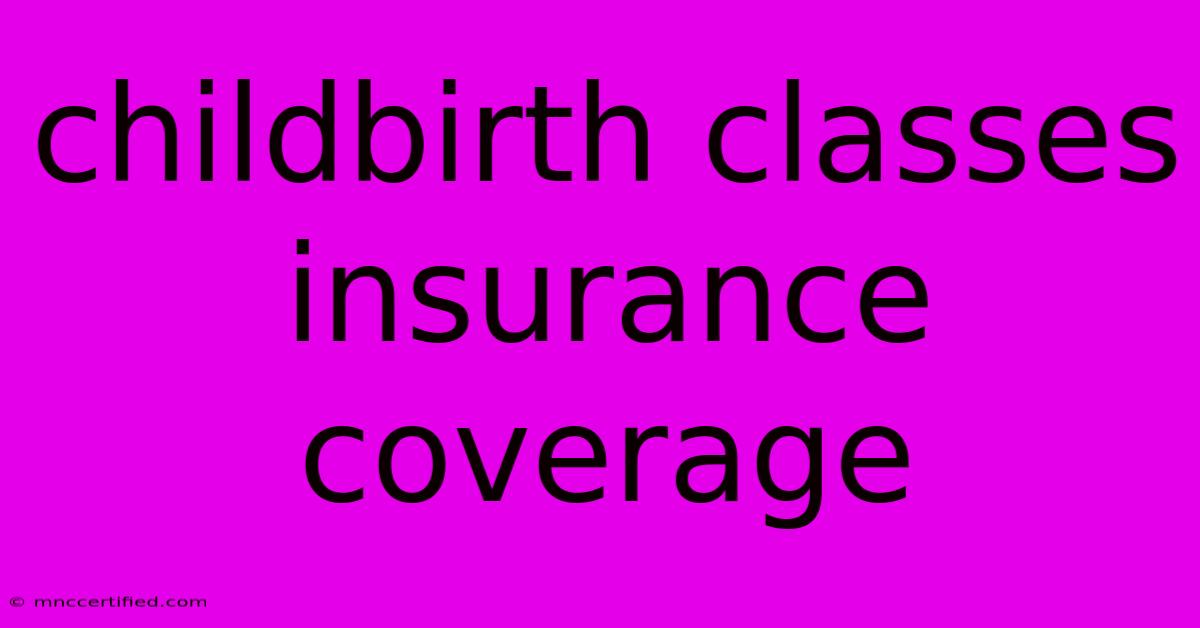Childbirth Classes Insurance Coverage

Table of Contents
Navigating the Costs: Understanding Childbirth Class Insurance Coverage
The journey to parenthood is filled with excitement, anticipation, and, let's be honest, a healthy dose of questions. One of the most common concerns for expectant parents is the financial aspect, particularly when it comes to preparing for labor and delivery. Childbirth classes are an invaluable investment in your journey, offering essential knowledge and empowering you to confidently navigate this exciting and sometimes daunting experience. But the question remains: do insurance plans cover the cost of childbirth classes?
The Complexities of Coverage
Unfortunately, there isn't a simple yes or no answer to this question. Coverage for childbirth classes varies greatly depending on your insurance provider, specific plan, and even the state you reside in.
Here's a breakdown of the factors influencing coverage:
- Insurance Plan Type: Some plans, like health savings accounts (HSAs) or flexible spending accounts (FSAs), may cover childbirth classes. However, coverage is often limited to a certain amount and may require pre-authorization.
- Plan Benefits: Many insurance plans offer "maternity benefits" which may include coverage for childbirth classes, but this is not guaranteed. Carefully review your plan's details and contact your insurer for clarification.
- Class Provider: Some providers are more likely to be covered by insurance than others. Hospital-affiliated classes may have a higher chance of being included in your plan's benefits.
- State Regulations: Some states have laws that require insurance plans to cover childbirth classes, but this is not the case across the board.
Finding Out Your Coverage Options
- Check Your Policy: Start by reviewing your insurance policy documents, focusing on the sections outlining maternity benefits. Look for specific mentions of "childbirth education" or "labor and delivery preparation classes."
- Contact Your Insurance Provider: Call your insurance provider directly and ask about their coverage for childbirth classes. Be prepared to provide your policy details and the specific classes you are interested in.
- Inquire with Class Providers: Many childbirth education providers offer information about insurance coverage and have experience working with different insurance plans. Ask them if they accept your insurance or can provide you with billing codes for your plan.
- Explore Alternative Funding Options: If your insurance doesn't cover childbirth classes, consider alternative funding options like:
- HSA or FSA: Utilize funds from your HSA or FSA, if available.
- Employer Benefits: Check if your employer offers any wellness or child care benefits that might cover classes.
- Local Community Resources: Look for local community programs or grants that support expecting parents.
The Value of Childbirth Classes
Regardless of whether your insurance covers the cost, childbirth classes offer significant value. These classes provide:
- Knowledge and Skills: Learn about labor and delivery, pain management techniques, breastfeeding, postpartum recovery, and more.
- Confidence and Empowerment: Feel more prepared and confident as you approach the birth of your child.
- Support System: Connect with other expecting parents and create a valuable support network.
- Reduced Anxiety: Gain a better understanding of the process, leading to reduced anxiety and a more positive birth experience.
Making the Right Decision
While insurance coverage can be a helpful factor, ultimately, the decision of whether or not to take childbirth classes should be based on your individual needs and preferences. Consider your budget, insurance coverage, and the value you place on the benefits these classes offer.
Remember: The knowledge and skills gained in childbirth classes can be an invaluable asset to you throughout your pregnancy and postpartum journey. Investing in your preparation can empower you to have a more confident, informed, and positive birth experience.

Thank you for visiting our website wich cover about Childbirth Classes Insurance Coverage. We hope the information provided has been useful to you. Feel free to contact us if you have any questions or need further assistance. See you next time and dont miss to bookmark.
Featured Posts
-
Vinicius Hat Trick Leads Madrid To 4 0 Win
Nov 10, 2024
-
Amari Williams Strength 400 Pounds Of Steel
Nov 10, 2024
-
Pete Wicks Gets Emotional On Strictly Dance
Nov 10, 2024
-
Former Girlfriend Speaks Out Against Hogg
Nov 10, 2024
-
Insurance Letter For Lightning Damage
Nov 10, 2024